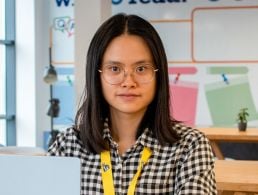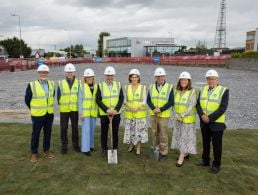How do you bridge the gap between college and a real-world tech job? One way is graduate programmes.
Patrick Aherne is in a graduate role at Version 1. Here, he tells us why the IT services company has been a good fit for him.
What did you study in college?
I studied business information systems at University College Cork.
With this programme, are you now working in your desired industry?
Yes, I am. The great thing about consulting, though, is that you get to work for clients across a range of industry categories. So, although in principle I work in IT, in practice I’ve gained experience in finance, public sector, aircraft leasing, education, and a number of other industry sectors.
While the day-to-day job is restricted to working on the IT systems of these companies, you’d be surprised how much knowledge you pick up on these industries along the way.
What drew you to Version 1 when you were seeking work as a graduate?
My initial interest in Version 1 stemmed from a presentation they gave to my final-year class in college. The pitch was better than any other I’d seen to that point, in terms of content and delivery.
I’d never heard of Version 1 before that, so it made a strong first impression.
From subsequent research, Version 1 stood out from the competition due to its quarterly rhythm, profit shares based on performance and vision of a workplace where egos are left at the door.
What expectations did you have before you began the programme?
I can’t remember what I expected before I began.
What duties and responsibilities were you given initially?
Initially, I joined a project team working on a major Microsoft CRM solution for a government body.
I started as a business analyst working on documentation for the project, with some testing involved. As the project progressed, I took on more testing responsibilities until my day-to-day work was about 50:50 of each.
Did the scope of your work change as the programme progressed?
Yes. As the project was finishing up a few months after I started, I asked if I could join the new ERP practice that was being spun off from the existing practices. I moved to the Oracle E-Business Suite functional team in February.
Can you describe a typical day in your role?
At a glance, my day-to-day role never changes. An IPC is logged by a client, I troubleshoot the issue and coordinate with the client to find a resolution. The problems can be simple or complex, and may require coordination with technical consultants or DBA colleagues, as appropriate.
However, aside from a small number of recurring issues, no two issues are the same and no two clients’ systems are the same. We provide support for versions 11 and 12 of Oracle E-Business Suite. Version 12 is vastly different from 11, both in looking at the user interface and at a deeper technical level.
On top of that, my team supports more than 50 clients in the UK and Ireland, and no two clients’ systems are the same. They all have their own business processes across numerous industry sectors, and their own implementations of Oracle E-Business Suite reflect that.
For example, a university and an aircraft leasing company would have completely different requirements from their Oracle systems and, thus, the kind of support issues we experience with each differ greatly.
How do your responsibilities compare to those of more experienced employees?
They don’t differ greatly from some of my more experienced colleagues, at present.
When I originally joined my current team, I was mostly given the simpler or more recurring issues to look at. This changed gradually as I gained more knowledge and was able to contribute more to the team.
I still need to ask advice from more experienced colleagues from time to time when trying to resolve complex issues but, equally, as I’ve learned more, I’m now in a position where I’m able to answer queries from more experienced employees.
Do you feel more prepared for working life after completing this programme?
Not only do I feel more prepared for working life, but I feel like I’ve already exited the grad programme and started working life.
In Version 1, the transition from grad to consultant is seamless. You get a chat with your manager and a letter one day to tell you you’ve passed probation, and that’s about it. From your first day, you continue to gain more knowledge and experience, so it’s difficult to draw a dividing line between graduate and consultant – it’s a continuous learning curve.
Why should someone apply to the graduate programme at Version 1?
There are a number of reasons to apply to Version 1.
Our core values and the culture we try to create gets a lot of external recognition, with the company consistently ranked as one of the best workplaces in Ireland over the past five years.
The graduate programme is second to none. The opportunities, and the flexibility to move around and gain experience in a number of different areas, are fantastic for your future career prospects – both within the company, and if you want to gain some experience in consulting before moving on to someplace else.
If successful, you get the chance to work for an ethical, rapidly expanding company with some of the best people in the IT industry.
You get to join in our mission to prove IT can make a real difference to our customers’ businesses while retaining a good work-life balance.
And, finally, because we’re hiring.
Looking for jobs in tech or science? Check out our Employer Profiles for information on companies hiring right now and sign up for our Career Republic e-zine for a weekly digest of sci-tech careers news and advice.




